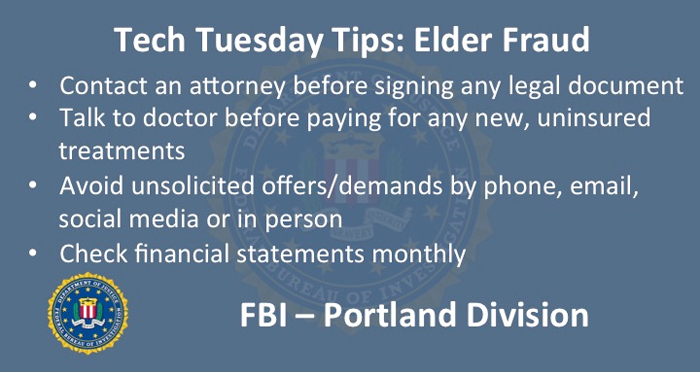Welcome to the Oregon FBI’s Tech Tuesday segment. This week, building a digital defense against frauds targeting senior citizens.
An estimated 10,000 Americans turn 65 every day … creating a large pool of potential victims for fraudsters looking to cash in on seniors’ savings accounts. In fact, the Department of Justice estimates that older adults lose more than $3 billion each year to financial scams.
Some of the most common schemes targeting seniors include:
* Overcharging for products or services… including the purchase of costly alternative or unproven treatments to address health issues.
* Lottery and sweepstakes frauds where the bad guy promises a big win if the victim just pays a small handling fee or tax.
* Sweetheart scams where the fraudster pledges love and companionship … but, first, he just needs some financial help to pay off some debts.
* Government impersonation frauds where the scammer poses as an IRS agent or law enforcement official demanding payment for some alleged violation.
* Technology frauds where the scammer convinces the victim that he needs help to fix a non-existent problem with his computer.
While anyone — young or old — can fall victim to these scams, seniors with cognitive impairment, health issues or other concerns are at higher risk. Add that to the fact that many seniors have a set amount of money in retirement — with little ability to recover financially should fraud occur — and the results can be devastating.
If you are an older American — or a caregiver for one — here are some things you can do to protect you and your family:
* Contact an attorney before signing any legal document.
* Talk to your doctor before agreeing to any health treatments not covered by your insurance — particularly those that require you to pay upfront or require you to commit to multiple sessions.
* Check financial statements every month for unusual activity.
* Avoid unsolicited contacts — whether by phone, email, at your door or in-person while you are out and about. It is OK to hang up the phone, delete the email or tell someone you are not interested and walk away.
If you have been victimized by this online scam or any other cyber fraud, be sure to also report it to the FBI’s Internet Crime Complaint Center at www.ic3.gov or call your local FBI office.




